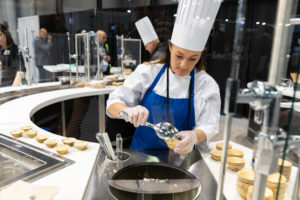SPRINGFIELD, IL – Wade Koehler confirms that F&B consultants are indeed feeling the pain of the global pandemic. As executive director of Foodservice Consultants Society International’s (FCSI) Americas Division, Springfield, Ill., Koehler hears from management consultants who are seeing a slowdown in their workload. “A lot of their projects have been put on hold or cancelled outright,” he says. “If they had monthly stipends, then they were putting those payments on hold for their clients.”
HX: The News caught up with Koehler to get a feel for the business consequences of a pandemic that has caused so much misery around the country.
 HX: The News: Within the world of food and beverage (F&B) consultants, how has the virus crisis affected consulting?
HX: The News: Within the world of food and beverage (F&B) consultants, how has the virus crisis affected consulting?
Koehler: There’s two different types of consulting with FCSI. There’s design consultants and management consultants. They’ve been affected very differently. With design consultants, not much has really changed. I’ve found in talking to a lot of consultants that maybe one or two percent of their design projects were cancelled outright. Most of them were put on hold until things kind of got back to normal because they couldn’t start construction, or they were moving forward just as they had been all along.
Designers are still getting, on average, five to ten RFPs per week. They’re still sending out proposals, and there’s still a lot of work for the designers. For designers in the non-restaurant world—the hotels, the stadiums, the corporate entities—there’s not a lot of changes being done to design work right now. They are kind of waiting to see how much of this pandemic may affect them down the road.
HX: The News: What about the management consultants?
Koehler: For the management consultants, a lot of projects have been put on hold or cancelled outright. If they had monthly stipends, then they were putting those payments on hold for their clients. They’ve been impacted a lot more. If you’re a heavy designer of restaurants, you’ve been impacted a lot as well. A lot of that just stopped and either got put on hold, or the money ran out and so nothing is going to be done. However, some got picked up because there’s some restaurants that had enough money and financial capital to withstand the shutdowns. They looked at it as an opportunity. They thought, ‘We might as well renovate right now because we have to be shut down anyway.’
HX: The News: Any concrete numbers on the financial impact at this point?
Koehler: Until we get to a fully open society again, I don’t think we’ll know the full financial impact. In my hometown of Bloomington, Ill., I know of at least five restaurants that are not opening back up at all. We probably had no idea they were struggling, but this exposed it. Others have tried to stay open with carry out and just can’t do it anymore.
HX: The News: What new technologies do you think might be seen in the kitchen or may be developed?
Koehler: Anything touch-less. There’s coffee systems, there are fountain systems for soda, there are bar systems. Anything that has the least amount of touch as you can make on a product or glass is being looked at very heavily right now. You can call that automation or just call it touch-less; More sneeze guards, more anti-microbial coverings or coatings on certain things, more disposable forks, knives, and spoons. I don’t think people want to go with those forever, because it’s not good for the environment.
HX: The News: Will things ever get “back to normal”?
Koehler: There’s a part of me that believes we’re going to see a change in the next two years, and then we’ll figure out what normal is. I don’t want to call it a ‘new normal’ because I don’t know how much it’s really going to change.
 HX: The News: And what of the fate of the buffet?
HX: The News: And what of the fate of the buffet?
Koehler: At the beginning of the pandemic, we heard, ‘There’s never going to be a buffet again’ and now you’re hearing that buffets are going to be down for a while, but nobody’s saying we will get rid of them permanently. Buffets right now are definitely going to be more labor intensive. The ones I’m hearing about that are working have got more people working at them, more sneeze guards, or some kind of guard.
It’s mostly being served versus an actual self serve buffet. But you look at people who have money that innovate, such as in Las Vegas, in the event planning industry—they’re likely going to come out with something new—probably with anti-microbial aspects. The more we know about COVID-19, the better. What we’ve heard last week may not be the same as what we heard three weeks ago. The only thing I know that we haven’t heard that the virus is being transferred through food, so that’s a great sign. Air flow is also something that’s going to be looked at very heavily too when it comes to operational changes and technologies.
HX: The News: What are three top tips for someone who is reopening a venue, particularly in a hotel or a restaurant fixed to a hotel?
Koehler: One of the three would be to get in and test your equipment sooner than later. If it’s been shut down for a while, does it fire back up the way it’s supposed to? Does it run well from an equipment standpoint? I don’t see the hotel industry rebounding quickly, so if you’re in a hotel restaurant, the other tip would be to buffer your expectations with sales. That’s going to be the hardest thing for anybody, is how much staffing do I need? It’s going to be based on geographic region. What kind of full service versus quick service versus fast casual type system?
HX: The News: People are getting back to restaurants in limited ways. Do you see that continuing?
Koehler: Our social instincts revolve around eating out and food. People are anxious to get back out and eat, and people want to know that they are going to a place that’s taken care of correctly. Word of mouth is going to be, ‘How safe did you feel in that restaurant?’
 I was in Kentucky recently, and I can tell you that there were some places I went into that normally I would have gone to on a regular basis, but I would not go back to right now. I could tell right away they were not being cleaned properly, or even being cleaned at all.
I was in Kentucky recently, and I can tell you that there were some places I went into that normally I would have gone to on a regular basis, but I would not go back to right now. I could tell right away they were not being cleaned properly, or even being cleaned at all.
We sat at a restaurant, and it was a national chain. The garbage was overflowing and tables were not being wiped down because they were way understaffed, and it was a fast casual concept. The impression you need to give to the customer is that you care.
HX: The News: Do you think old school room service will regain popularity?
Koehler: I think so. If you’re attending a conference, and I’m a meeting planner too, I don’t know what kind of food I’ll be able to serve you at an event anymore. It might be a lot of boxed lunches and a lot of different types of food. So you might see a lot more late night dining in full service hotels where guests want a bigger meal brought to the room late at night because they didn’t get enough to eat while they were at the event. Before, we would have given you a full buffet, and you would have walked away happy with food and alcohol. Now you may not have that, so I could see it picking up quite a bit.
